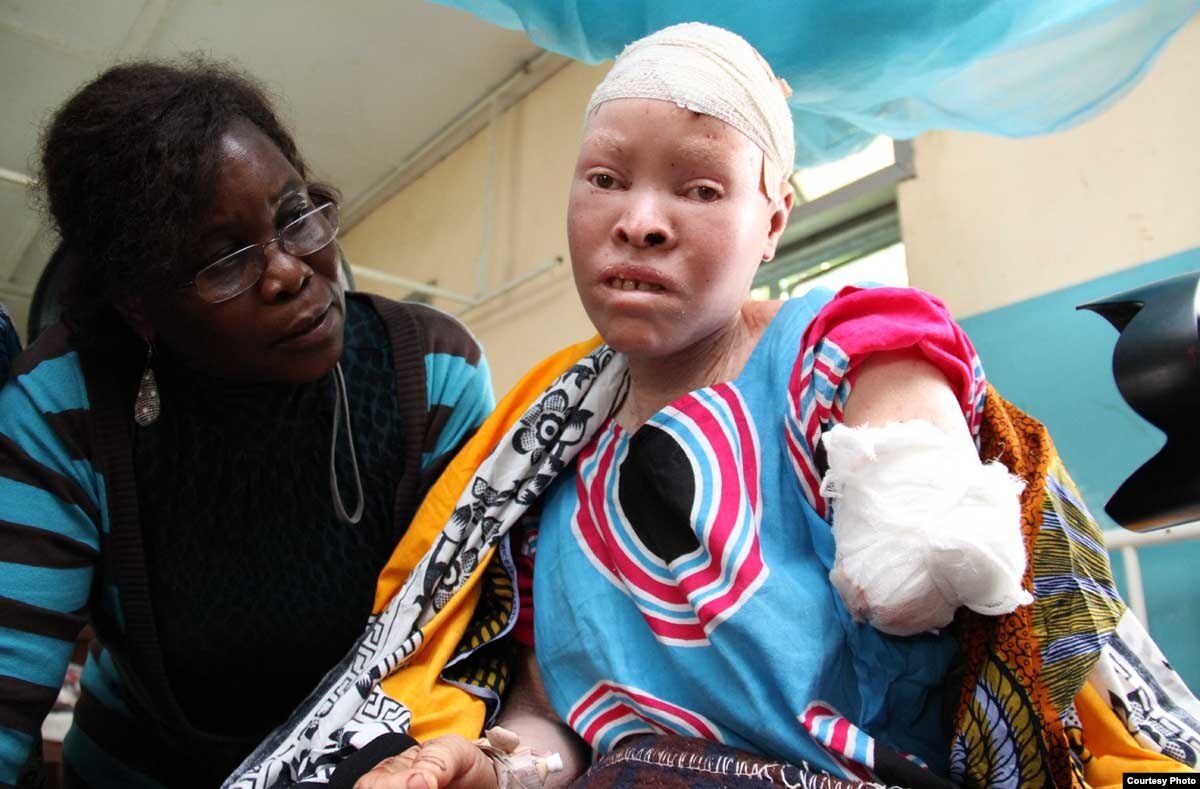
The United Nations is expressing alarm at a spate of recent attacks in Tanzania against people with albinism. The body parts of albinos - people who are born without skin pigmentation - are used by witchdoctors in ritual potions meant to bring power and wealth. Four such attacks took place in a 16-day period this year - three of them against children. Police in Tanzania say they are investigating the attacks, and also are appealing to the public to come forward with any information.
The U.N. human rights agency called the latest attacks on albinos "abhorrent." It urged the Tanzanian government to do more to end the violence and discrimination against the group.
The string of attacks began on January 31 in Tanzania’s central Tabora region.
A group of men chopped off the arm of a seven-year-old albino boy, killing him and the 95-year-old grandfather who tried to shield him.
On February 5, in the northern Simiyu region, armed men attacked the home of a seven-month-old boy with albinism, but he survived thanks to villagers who rallied to protect him. Six days later, in western Rukwa region, five armed men attacked a 39-year-old mother, said Rupert Colville, spokesman for the U.N. High Commissioner for Human Rights.
"Allegedly one of the armed men was actually her own husband and her left arm was cut off. She was actually in the house with two of her children. But she wasn’t killed. Five suspects were arrested and her arm recovered with the money because the limbs are being sold."
In the same region only four days later, a group of men chopped off the arm of a 10-year-old boy as he was headed home from school.
An especially worrying trend, Colville said, is that the mutilations are taking place while the victims are alive.
"Some people believe the magic is stronger if the victim screams when the attacks take place, and obviously if you kill a person first they don’t scream," he said. "It would explain why you get these people having limbs cut off while they are still alive, which is what happened in I think three of these recent cases."
In Tanzania, where witchcraft is an entrenched practice, some segments of society believe people with albinism are less than human - even phantoms, who do not die but simply disappear. Aside from the discrimination, they face the constant threat of being attacked, mutilated and killed for their blood and body parts for use in witchcraft.
Amadou Diallo, a person with albinism, left Africa after he was nearly killed by armed men in Guinea. He offered this plea to African leaders and citizens.
“We are different only because we don’t have pigmentation," said Diallo. "Beyond that we are human beings just like them, so we need them to accept us, to integrate us among them, to give us a job when there is a job available, to not discriminate.”
Diallo now works for Under the Same Sun, a Canada-based foundation that advocates for people with albinism, particularly in Tanzania. Founder Peter Ash said the problem exists in more than a dozen African countries.
"Some of the organs are shipped out of the country," he said. "There is also a cross-border Internet trade of various African countries in these parts. This is not just a Tanzanian phenomenon.”
U.N. officials say they do not know what sparked the string of killings in recent weeks. A large surge in such crimes took place in 2008, when 24 people with albinism in Tanzania were killed for body parts.
In the murky and secretive world of witchcraft, so much remains speculative. But one thing is clear: a good deal of money is paid out for the body parts, according to Ash.
"The people who are buying these organs are spending thousands of dollars," he said. "The arm or leg of a person with albinism sells for between $2,000 to $4,000. A complete set of organs of a person with albinism sells for over $100,000. Now you have to ask yourself, in such in a black market, who in a poor country like Tanzania has that kind of money? Very, very few people.”
U.S. human rights agency spokesman Rupert Colville urged the government to do more to tackle the problem.
“It’s not really clear why the sudden upsurge, and it’s very worrying, said Colville. "I think it is so abhorrent what is going on here - that people are attacked because of what they look like - that you know the government really does need to make an extra special effort to stamp it out once and for all.”
The Tanzanian government has in fact publicly condemned the attacks in recent years. It has also opened shelters for albino people, and called for the prosecution of witch doctors linked to killings. Those actions are believed to have helped lower the number of attacks - until now.
The U.N. human rights agency and activists are calling for the government to help deter further attacks by aggressively prosecuting witchcraft-related violence. The U.N. says out of 72 documented murder cases since 2000, only five have been successfully prosecuted.
Comments
Post a Comment